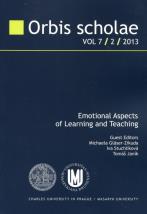Achievement Emotions of Boys and Girls in Physics Instruction: Does a Portfolio Make a Difference?
Achievement Emotions of Boys and Girls in Physics Instruction: Does a Portfolio Make a Difference?
Author(s): Michaela Gläser-Zikuda, Susi Limprecht, Tomáš JankoSubject(s): Essay|Book Review |Scientific Life
Published by: Univerzita Karlova v Praze, Nakladatelství Karolinum
Keywords: achievement emotions; well-being; gender; Physics instruction; portfolio intervention; quasi-experimental study; German Grammar School
Summary/Abstract: It is well documented in educational research that instruction in science − including Physics − is connected with rather negative emotions of students. It becomes especially apparent when considering the gender differences. Therefore, an important question is whether and how achievement emotions of boys and girls in Physics may be positively influenced. The aim of this study is to analyze firstly the differences regarding positive and negative emotions of boys and girls in Physics instruction. Secondly, a quasi-experimental intervention study has been carried out to test whether and how girls’ and boys’ emotions may be influenced by the application of a portfolio approach in Physics instruction. Covariance and multivariate analyses were carried out to test the hypothesized effects of the intervention. The Physics instruction focused on the topic of electricity. The research sample consisted of N = 161 students from eight 8th grade classrooms of three grammar schools in Germany which were divided into treatment and control groups randomly. Our study confirmed that boys generally experience more positive achievement emotions in Physics than girls, whereas girls showed higher level of anxiety and boredom than boys. The hypothesized effects of the portfolio intervention were only partly confirmed. The differences between boys and girls regarding their well-being in Physics instruction before the intervention have been slightly reduced by the application of the portfolio. Girls’ well-being in the treatment group increased after the application of a portfolio compared to girls in the control group. As expected, self-concept and interest have been revealed as significant covariates influencing students’ achievement emotions. Limitations of the study as well as implications for instruction are discussed. It is suggested that a portfolio represents a promising approach for the equalization of gender differences regarding achievement emotions in Physics.
Journal: Orbis scholae
- Issue Year: 7/2013
- Issue No: 2
- Page Range: 43-66
- Page Count: 24
- Language: English

